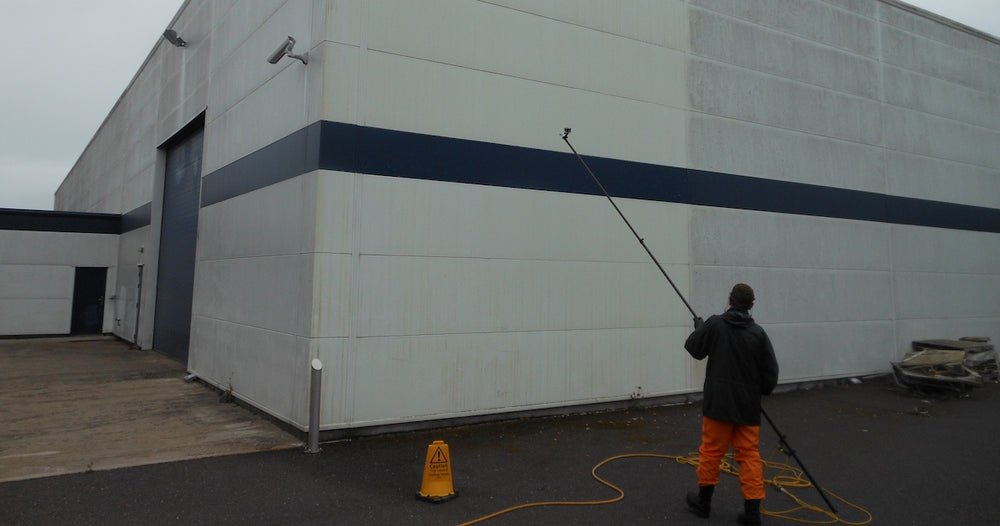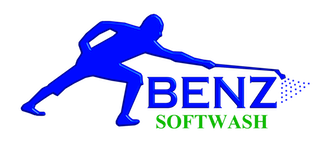
Every week we receive a large number of questions about soft washing. And, as new contractors are coming into the business all the time, questions are often repeated.
So we thought it would be useful to put together the most frequently asked questions in some Trade Tips posts.
This week's questions:
QU: SHOULD I USE LIGHTNING CLEANZE ON METAL STREET AND SHOP SIGNS?
A: If I the metal sign is pvc coated or similar then the sign itself should be fine. They will be designed to withstand the powerful oxidation properties of hot sunlight and atmospheric salt. This will be especially true if you live near the coast as a local sign-maker should have taken that into account.
To be super-safe we would take the following precautions:
1) Apply Lightning Cleanze as weak as possible at first, until you know the results. Starting at 10:1 will usually suffice.
2) Avoid treating in hot direct sunlight.
3) Pre and post post-rinse as you would for windows and frames when treating render.
QU: SHOULD I RINSE A VEHICLE AFTER CHEMICAL SPRAY HAS DRIFTED ONTO IT?
A: A vehicle's paintwork is designed to withstand harsh environments. That said, we advise against allowing any chemical product to land on a customer's vehicle.
There is a small possibility that a vehicle's polish/coating layer could be damaged. So its best to make sure you will not spray cars or other property in the first place.
Quick tips:
01: Skilful use of a water-fed brush at the edges of an elevation eliminates virtually all spray drift.
02: Rinsing an affected vehicle with tap water will wash off the spray drift but may leave hard water marks that will have to be removed by hand with a shammy. So it's best to use purified (de-ionised) water if you have that available.
The simplest solution of course is to ask your customer to move vulnerable vehicles to a safe location, away from all possibility of them being affected by spray drift, for the duration of your treating their property.
If your customer objects to moving their vehicles to a safe place you may want to consider if you actually want people with that mentality as a customer ...
QU: WHAT’S THE BEST WAY TO CLEAN WINDOWS AFTER TREATING THE SURROUNDING WALLS WITH BIO CLEANZE?
A: Whenever practicable we clean windows with a mop and squeegee after treating with Bio Cleanze. This avoids the danger of rinsing Bio Cleanze from the treated surface before it has had time to soak in and dry.
Quick tip: Holding the mop under the blade as it moves along the glass will catch the majority of run-off from cleaning a window. Only a few drips will fall onto the sills, which can be quickly wiped off.
If this is not possible, due to difficulties with access for example, or there's simply not enough time to allow Bio Cleanze to fully dry, then there may be no choice other than to return the next day and use WFP.
Warm weather will often rapidly and completely dry an area treated with Bio Cleanze. This can allow windows to be cleaned, even with a WFP, on the same day
Quick tip: If the frames are severely infested, we often give them a treatment and rinse with Lightning Cleanze before treating them and the surrounding area with Bio Cleanze.
Prevention is better than cure: By using skillful spray techniques it's possible to minimise spraying the glass with Bio Cleanze in the first place. This makes life a lot easier and completing the job a lot quicker.
QU: HOW SHOULD I TREAT A HOT ROOF WITH BIO CLEANZE?
A: Following a standard treatment the biofilm will almost certainly be dead in a few minutes and you will see good results. And Bio Cleanze is even more effective when warm.
However, because much of the product will have boiled off before soaking in, the long-term residual effect of protection from re-colonisation will likely be reduced when treating a hot roof or other surface.
To get the best out of Bio Cleanze, the longer the activation time you can give it the better. This allows the product to soak in deep and so be sure of killing all the spores.
That said, when working in high heat or rain showers this is not always possible, so a contractor can only do the best they can.
These techniques can help make treating a hot roof more effective:
1) When treating roofs it is essential that Bio Cleanze is allowed to creep under the laps and between the slates or tiles (through capillary action). A substantial flooding of the joints ensures this.
2) On a hot day, in addition to lightly pre-spraying the roof with water to cool it, you could first flood a section the roof with Bio Cleanze at 40:1 by spray application. Then brush in a second application just before the first application has dried.
This method promotes a greater contact time, giving the product longer to creep under the laps of the tiles or slates. The amount of product you use will be about the same as for as single application at 20:1.
Click here to learn more about soft washing roofs
We hope this information is helpful and sincerely wish you great success in your soft washing business.
Team Benz



Responses
house washing companies near me
Very interesting and thanks for sharing such a good blog. Your article is so convincing that I never stop saying something about it. You’re doing a great job. Keep it.
April 16, 2024
Leo Searle-Hawkins
Thanks Mike – doing our best!
November 11, 2020
Mike Williams
Good advice Ben
Keep them coming!
Regards
Mike
Total External Clean
November 11, 2020
Leave a comment